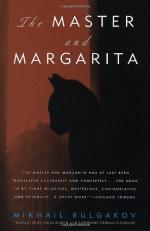|
This section contains 14,647 words (approx. 49 pages at 300 words per page) |

|
SOURCE: Lakshin, Vladimir. “Mikhail Bulgakov's The Master and Margarita.” In Twentieth-Century Russian Literary Criticism, edited by Victor Erlich, pp. 247-83. New Haven, Conn.: Yale University Press, 1975.
In the essay that follows, Lakshin presents an overview of The Master and Margarita and the novel's place in modern Russian literature.
Where there is no love of art, there is no criticism either. “Do you want to be a connoisseur of the arts?” Winckelmann says. “Try to love the artist, look for beauty in his creations.”
Pushkin1
On a strange, fantastic moonlit night after Satan's Ball when Margarita is united with her beloved by the power of magic charms, the omnipotent Woland asks the Master to show him his novel about Pontius Pilate. The Master is in no position to do this. He has burned his novel in the stove. “This cannot be,” retorts Woland. “Manuscripts don't burn.” And at that...
|
This section contains 14,647 words (approx. 49 pages at 300 words per page) |

|


